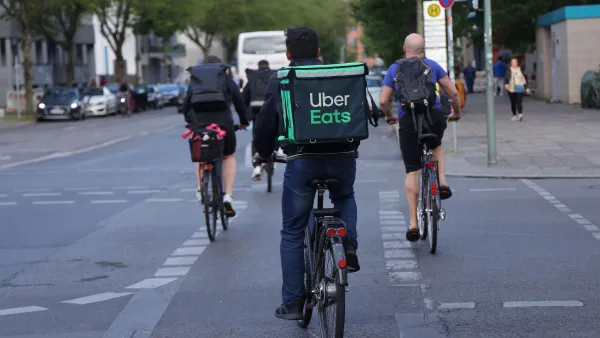Dive Brief:
- DoorDash and Coco have signed an agreement to offer robotic delivery from nearly 600 merchants in Chicago and Los Angeles, the companies said in a press release.
- As part of the deal, DoorDash completed over 100,000 deliveries using Coco’s robots in Los Angeles during the pilot phase of the partnership. DoorDash, via its international Wolt arm, and Coco also have an international partnership in Helsinki, Finland.
- Sidewalk robot delivery is an emerging point of competition between delivery giants, as Uber Eats and Grubhub have expanded their robotic delivery deals in recent years.
Dive Insight:
A DoorDash spokesperson said the Coco robots will be used when they are the most efficient delivery options. Orders within a set radius of a merchant can be automatically assigned to a robot.
“Not every delivery needs a 2-ton car just to deliver two chicken sandwiches,” said Harrison Shih, senior director of DoorDash Labs. “We believe the future of delivery will be multi-modal, and we’re thrilled to partner with Coco to expand sidewalk robot deliveries that complement the Dasher network.”
Coco has a fleet of about 1,000 delivery robots, and has been operating in Los Angeles since 2020. The company recently launched in Chicago, Miami and Helsinki. Coco’s robots have been delivering Uber Eats orders since last year, and Uber has looked to robotics partnerships in an effort to improve its competitive position relative to category leader DoorDash.
DoorDash claims it is “uniquely positioned to enable commercialized autonomous delivery,” thanks to DoorDash Labs, and its work on drone delivery with companies like Wing. A major expansion of robotic delivery could help it protect its market share edge against Uber Eats.
DoorDash said it doesn’t expect the use of robots to meaningfully impact the volume of deliveries assigned to workers, but that robots would likely lead to an incremental growth in orders. Workers will continue to complete the bulk of DoorDash’s orders, the spokesperson said.
Introducing robots for deliveries has other potential benefits for delivery aggregators. Robots don’t need a wage, they don’t need healthcare or liability insurance, and they can’t form unions, go on strike or lobby for labor law reform. Workers who see themselves as replaceable, by other workers or by machinery, are less likely to engage in collective action than workers who view their own labor as indispensable.
Correction: A previous version of this article misidentified where 100,000 DoorDash deliveries via Coco bots were completed. The deliveries were made in Los Angeles during the pilot phase of DoorDash and Coco’s U.S. partnership.














